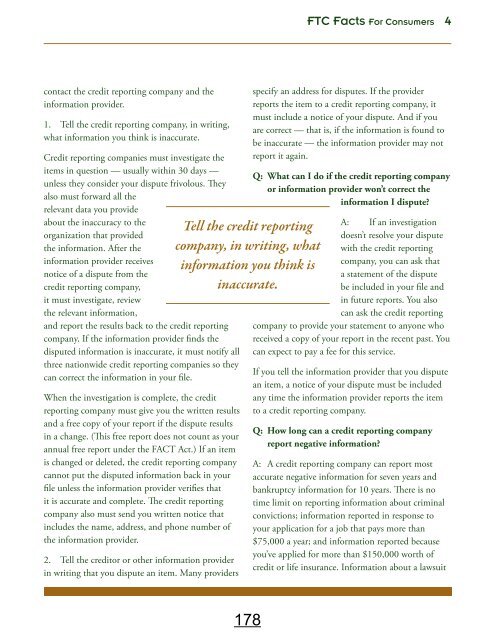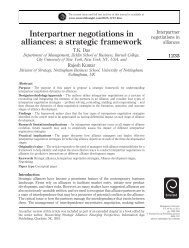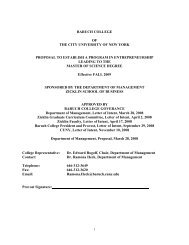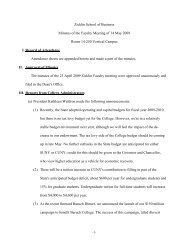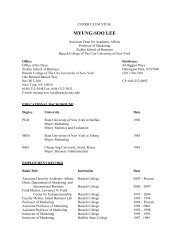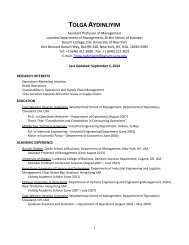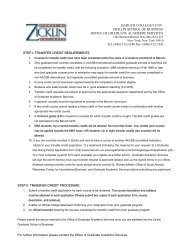Tax Seminar #3 – December 3 2012
Workbook - Zicklin School of Business
Workbook - Zicklin School of Business
You also want an ePaper? Increase the reach of your titles
YUMPU automatically turns print PDFs into web optimized ePapers that Google loves.
FTC Facts For Consumers 4<br />
contact the credit reporting company and the<br />
information provider.<br />
1. Tell the credit reporting company, in writing,<br />
what information you think is inaccurate.<br />
Credit reporting companies must investigate the<br />
items in question — usually within 30 days —<br />
unless they consider your dispute frivolous. They<br />
also must forward all the<br />
relevant data you provide<br />
about the inaccuracy to the<br />
organization that provided<br />
the information. After the<br />
information provider receives<br />
notice of a dispute from the<br />
credit reporting company,<br />
it must investigate, review<br />
the relevant information,<br />
and report the results back to the credit reporting<br />
company. If the information provider finds the<br />
disputed information is inaccurate, it must notify all<br />
three nationwide credit reporting companies so they<br />
can correct the information in your file.<br />
When the investigation is complete, the credit<br />
reporting company must give you the written results<br />
and a free copy of your report if the dispute results<br />
in a change. (This free report does not count as your<br />
annual free report under the FACT Act.) If an item<br />
is changed or deleted, the credit reporting company<br />
cannot put the disputed information back in your<br />
file unless the information provider verifies that<br />
it is accurate and complete. The credit reporting<br />
company also must send you written notice that<br />
includes the name, address, and phone number of<br />
the information provider.<br />
2. Tell the creditor or other information provider<br />
in writing that you dispute an item. Many providers<br />
Tell the credit reporting<br />
company, in writing, what<br />
information you think is<br />
inaccurate.<br />
specify an address for disputes. If the provider<br />
reports the item to a credit reporting company, it<br />
must include a notice of your dispute. And if you<br />
are correct — that is, if the information is found to<br />
be inaccurate — the information provider may not<br />
report it again.<br />
Q: What can I do if the credit reporting company<br />
or information provider won’t correct the<br />
information I dispute?<br />
A: If an investigation<br />
doesn’t resolve your dispute<br />
with the credit reporting<br />
company, you can ask that<br />
a statement of the dispute<br />
be included in your file and<br />
in future reports. You also<br />
can ask the credit reporting<br />
company to provide your statement to anyone who<br />
received a copy of your report in the recent past. You<br />
can expect to pay a fee for this service.<br />
If you tell the information provider that you dispute<br />
an item, a notice of your dispute must be included<br />
any time the information provider reports the item<br />
to a credit reporting company.<br />
Q: How long can a credit reporting company<br />
report negative information?<br />
A: A credit reporting company can report most<br />
accurate negative information for seven years and<br />
bankruptcy information for 10 years. There is no<br />
time limit on reporting information about criminal<br />
convictions; information reported in response to<br />
your application for a job that pays more than<br />
$75,000 a year; and information reported because<br />
you’ve applied for more than $150,000 worth of<br />
credit or life insurance. Information about a lawsuit<br />
178


